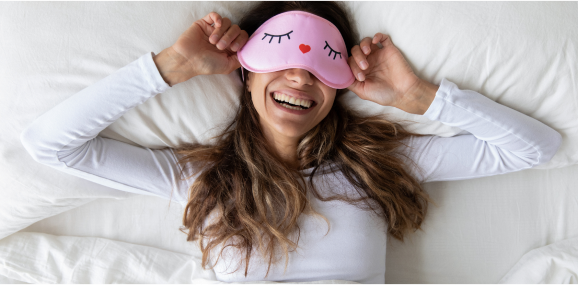Sleep is a mysterious thing. We’re not conscious during the process, and our body can’t directly tell us what’s happening when we’re off in dreamland. Sleep is one of the most important factors in your overall health, and you know you need it — but do you know why?
Here’s what your body is doing behind the scenes while you’re tucked away at night.
What Are the Consequences of Sleep Deprivation?
Sleep is a very important process for recharging your body and helping it to process, heal, and recover from the day. If your body lacks the restorative power of sleep, its overall capacity will be limited. Your energy will be low, you won’t feel right, and you probably won’t get much accomplished.
Your body needs between seven and nine hours of quality sleep to fully recharge itself so it can operate at its full capacity. Without adequate sleep, you’ll notice a plethora of negative side effects on your wellbeing and mental health.
8 Benefits of Sleep (and 8 Consequences of Sleep Deprivation)
1. Better Energy Levels Throughout the Day
If you don’t get enough good sleep, your body will be asking you for more sleep all day. You’ll drag your feet around and be a little listless. Your body might feel heavy, and your mind might feel a little foggy.
This can lead you to reach for a cup of coffee — or two, or three, or four. There’s nothing wrong with a cup or two, but if you start treating your mug like your lifeblood, that’s a sign that something is wrong.
When you get enough sleep and exercise and eat a well-balanced diet — and if you’re not struggling with chronic or even temporary illness — your body should be able to naturally produce the amount of energy you need to get throughout the day. You shouldn’t hit an afternoon slump or feel the need to resort to quick fixes like caffeine or energy drinks to keep you afloat.
2. Improved Capacity for Mental Focus
If you’re pulling all-nighters, you may not be as productive as you’d like to be. You’re working more hours, but the quality of your work is likely to suffer as a result of your lack of sleep. After all, your brain needs that sleep to process information and wipe the slate clean.
With less sleep, you’ll have trouble concentrating or staying motivated. You might find yourself mindlessly staring out the window, spacing out when you’re trying to get things done.
Turning in early, getting some sleep, and returning refreshed in the morning is a better strategy. Your mental acuity will return the next day, and you’ll benefit from a fresh perspective.
3. Reduced Potential for Unwanted Weight Gain
When you don’t sleep enough, your body desperately wants energy. It may prompt you to turn to food for fuel. Our bodies need fuel several times a day to keep going, and well-balanced meals are important. It only becomes a problem when your hunger cues are overcompensating for your lack of sleep.
Sleep deprivation puts stress on your body, changing the delicate balance of your main appetite-regulating hormones: ghrelin and leptin. Ghrelin tells your body when you’re hungry, and leptin tells your body when you’re full. When you aren’t sleeping enough, your body produces more ghrelin and less leptin.
When you’re tired, you’re also in no hurry to exercise. You don’t feel the need to go on a run… and you’d probably rather lie down and stay still. Unfortunately, increased hunger combined with a lack of physical activity can easily lead to obesity.
Getting better sleep, eating properly, and creating more opportunities for exercise are all crucial parts of staying healthy.
4. Better Long-Term Memory
When you’re asleep, your brain works on building the bridge between yesterday and today. Your brain moves the important parts of the previous day’s events into your long-term memory in a process known as memory consolidation. Without enough sleep, your whole week may begin to feel like one very long day.
Your brain needs this time to process the things you’ve learned and handle new information. If you aren’t giving it time to convert your short-term memory into long-term memory, you’re likely to feel forgetful and have trouble problem-solving. It may also be harder for you to grasp new skills or forge ahead in your career or hobbies.
5. Improved Exercise Recovery
When you’re working out to gain strength, you’re creating microtears in your muscles as a normal part of getting stronger. Your body works to repair these small tears, which strengthens your muscles and improves their tone. Your body needs time and space to facilitate this recovery process, however, and sleep is its prime opportunity.
As much as it might seem like waking up at blue dawn to go for a run is the best way to demonstrate your commitment to fitness, this isn’t always the case. You should only be waking up before daylight if you went to sleep very early. Sacrificing sleep for perceived physical health will only set you back.
When you’re awake, your body is actively using your muscles. When you’re sleeping, your body is able to devote the entirety of its energy to repairing and recovering. If you’re not getting the sleep your body needs to recover, you might experience muscle soreness and reduced stamina when you’re physically active.
As a result, your athletic progress may slow down, and you might become more prone to athletic injury.
6. Sleep Protects Your Heart
Inadequate sleep puts a lot of stress on your body. When you’re under stress, your body works differently. It releases cortisol, also known as the stress hormone. Cortisol makes your body work harder to perform even the most basic functions. When your cortisol levels are high, your heart has to work overtime to keep beating.
Your stressed heart muscle is just as prone to fatigue as any other muscle in your body — and an overtaxed heart can easily lead to heart disease. Sleep, in conjunction with things like a proper diet and adequate exercise, works to keep your heart as healthy as it should be.
7. Sleeping Fortifies Your Immune System
You probably feel sleepy and drained when you’re sick. That’s your body telling you to get some shuteye so it can perform all of its important background processes.
While you’re asleep, your body sends out helpful immune cells to combat unwanted invaders that cause illness. This valiant battle takes place while you’re asleep, and it’s possibly responsible for the occasional surreal fever dream.
The Centers for Disease Control and Prevention (CDC) recognize the importance of sleep when there’s an infection to fight or tissue to repair. In short, sleep helps your body ward off disease. A lack of sleep or poor sleep can have serious consequences for your immune system and may make you more prone to developing serious health complications like type 2 diabetes.
When you don’t feel good, sleeping is your superpower. Stay hydrated, eat light and healthy meals, and sleep for as long as you need to.
8. Sleep Reduces Your Risk of Accidents
You might have seen billboards on long stretches of road during a road trip that warn of the dangers of driving tired. They’re not kidding. Sleeping six hours or less per night is associated with a 33% higher risk of car accidents than sleeping seven or more hours per night.
When you don’t get enough sleep, your reflexes slow, your reaction times take a dive, and your cognition drops. The effects can be so significant that driving tired is actually comparable to driving drunk.
Slowed reflexes and cognition can be linked to all sorts of accidents. One study found that tired employees are about 70% more likely to be involved in workplace accidents.
Maybe you’re not clumsy — maybe you’re totally exhausted.
One of the benefits of sleep is that it makes you a better driver and a better worker. It improves your reflexes and your ability to concentrate in ways that make your everyday life safer. That’s right — getting enough sleep may make you a better ping pong player, video gamer, or athlete.
All in all, getting the right amount of sleep will make you sharper and more focused in everything you do.
How To Get a Good Night’s Rest
Adults should be getting between seven and nine hours of sleep a night, with seven hours as a safe minimum. (If you feel best when you’ve had your full nine hours, plan for that as your minimum.)
If you have trouble sleeping and your healthcare provider has ruled out the possibility of a sleep disorder or other conditions like sleep apnea, here’s what you can do to make bedtime better.
Set a Bedtime and a Wake Time
Sleep is something that you have to schedule. You can’t get 8 hours of sleep if you go to bed at 2 a.m. and wake up at 7 a.m. You need to give yourself a firm bedtime — the time you are officially in bed without any distractions — to allow yourself the opportunity to get enough sleep.
If you naturally wake up before your alarm goes off, give yourself a few minutes to try to go back to sleep. Your body might need time to adapt to a new schedule, particularly if it’s used to being deprived of sleep.
Get Rid of Distractions
Don’t tuck yourself in with your phone or start streaming a show. The blue light from your devices can interfere with your body’s circadian rhythm, or sleep-wake cycle.
When your eyes perceive blue light from screens, your brain’s messaging system can’t usually tell the difference between screen light and daylight. This can delay your body’s process of preparing you for sleep.
Give Yourself a Bedtime Hug
It’s impossible to get enough sleep when you’re not comfortable, so make sure your room is at the right temperature, you have good airflow, and there’s white noise to create an ambient environment. You’ll know what’s best for you, since the balance to achieve healthy sleep is a little different for everyone.
Lastly, you need to feel secure. That’s where the Hug Sleep Pod comes in. Our sleep pod is like a little cocoon that swaddles you into good dreams. Crawl inside, and the four-way stretch provides gentle compression. Or, pop your feet out with our Sleep Pod Move for temperature regulation and a little mobility.
Either way, the Hug Sleep Pod is like a hug that embraces your whole body — but it’s based on the science of deep touch pressure therapy, or DTPT. Deep touch pressure therapy provides the same feel-good sensory stimulation that massages do. Studies have shown that it helps soothe the nervous system and ease your mind and body into relaxation.
Hop in a Hug Sleep Pod today to start taking advantage of all the benefits that sleep has to offer. It’s the gentlest way to fall asleep.
Sources:
Sleep and Weight Gain: What's the Connection? | Mayo Clinic
Fever Dreams: Causes and Meaning | Sleep Foundation

































500,000+ happy customers